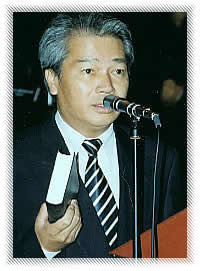The latest destruction of a number of houses by the Land and Survey Department at Mile 15, Mukah-Selangau Road has been described as yet another evidence of cruelty on the part of the state BN government.
Mensekar Banyau, aged 70, has lodged a report with the Police at Selangau Police Station two days ago accusing the enforcement officers from the Land and Survey department of being “zalim” (cruel) against the occupants of three houses when they came and destroyed the houses and their properties.
“We tried to stop them from destroying our houses and properties, but we were helpless. Their actions made us very angry and we lost about RM60,000 worth of properties," he said to a reporter from Utusan Borneo.
“They should have notified us,” he said and added that they were now staying with their relatives in other longhouses.
According to him, the enforcement officers on 16 October last year destroyed a number of houses in the area.
“Before the case is settled, the enforcement officers on Thursday, 26 February 2009 at 10.30 a.m. destroyed three more houses. At that time only me and my wife were at home; the rest had gone to work. We tried to salvage our properties, but could not do it as they used a bulldozer to destroy the houses,” he said.
Mensekar claimed that they had not been notified by the Land and Survey Department nor informed that their houses were to be demolished.
He admitted, however, that he had partially dismantled his house when they told him that a public road passed through the part of the house. And he was also told by the staff of the department that the other half of the house could still be occupied as it did not obstruct the proposed road.
That was why, he said, that they did not move out.
“They clearly cheated us,” said another villager, Nyunkin Renjau and listed their possessions being destroyed included paddy, fertilizers, motorcycles, antiques, bedding, clothing and cash.
The victims are known to be strong supporters of the MP for Selangau and Deputy Minister Joseph Entulu Belaun who is deputy president of Parti Rakyat Sarawak (PRS).
Why couldn’t Joseph Belaun help them? Or for that matter Joseph Mauh, State Assemblyman for Tamin? After all this is what our elected representatives are supposed to do – help their supporters.
Mensekar Banyau, aged 70, has lodged a report with the Police at Selangau Police Station two days ago accusing the enforcement officers from the Land and Survey department of being “zalim” (cruel) against the occupants of three houses when they came and destroyed the houses and their properties.
“We tried to stop them from destroying our houses and properties, but we were helpless. Their actions made us very angry and we lost about RM60,000 worth of properties," he said to a reporter from Utusan Borneo.
“They should have notified us,” he said and added that they were now staying with their relatives in other longhouses.
According to him, the enforcement officers on 16 October last year destroyed a number of houses in the area.
“Before the case is settled, the enforcement officers on Thursday, 26 February 2009 at 10.30 a.m. destroyed three more houses. At that time only me and my wife were at home; the rest had gone to work. We tried to salvage our properties, but could not do it as they used a bulldozer to destroy the houses,” he said.
Mensekar claimed that they had not been notified by the Land and Survey Department nor informed that their houses were to be demolished.
He admitted, however, that he had partially dismantled his house when they told him that a public road passed through the part of the house. And he was also told by the staff of the department that the other half of the house could still be occupied as it did not obstruct the proposed road.
That was why, he said, that they did not move out.
“They clearly cheated us,” said another villager, Nyunkin Renjau and listed their possessions being destroyed included paddy, fertilizers, motorcycles, antiques, bedding, clothing and cash.
The victims are known to be strong supporters of the MP for Selangau and Deputy Minister Joseph Entulu Belaun who is deputy president of Parti Rakyat Sarawak (PRS).
Why couldn’t Joseph Belaun help them? Or for that matter Joseph Mauh, State Assemblyman for Tamin? After all this is what our elected representatives are supposed to do – help their supporters.
Anyway the latest incident which is one of the many cases where Dayak longhouses have been destroyed should open the eyes of the voters of Batang Ai who will soon witness a by-election. They are given a choice: vote for BN and condone the destruction of longhouses or vote for PKR for your rights, fairness and justice. – The Broken Shield
Source: www.thebrokenshield.blogspot.com
Source: www.thebrokenshield.blogspot.com












